radio-personalities
Ira Glass
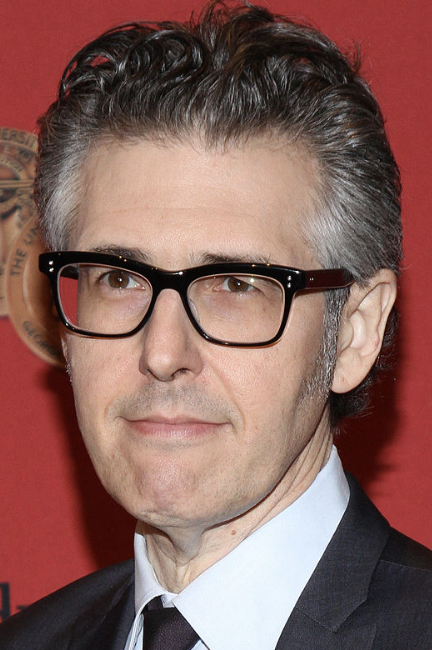
On this date in 1959, radio personality Ira Glass was born to Jewish parents in Baltimore, Md. While in college he interned at National Public Radio, where he worked after graduating from Brown University with a degree in semiotics in 1982. Glass worked as a production assistant for “All Things Considered” and then as a reporter for National Public Radio, spending a year in a high school and a year in an elementary school reporting on education.
In 1989 he moved to Chicago to co-host a show called “The Wild Room.” In 1995 the radio program “This American Life” debuted, produced and narrated by Glass. By 2016 it was reaching over 4 million listeners each week. In 2013 the WBEZ board voted to raise his salary from $170,000 to $278,000 but he asked for it to be lowered to $146,000 the next year, calling the original sum “unseemly.” He supplements his income with speaking engagements.
Glass says that his family was always secular and that he stopped believing in God soon after his bar mitzvah at age 13: “I found I just didn’t believe in God.” (Chicago Tribune, Dec. 14, 2000.)
Glass married writer and editor Anaheed Alani in 2005. “We have the entire Middle East crisis in our house,” he joked. “Her mom is Christian and her dad is Muslim, from Iraq.” They divorced in 2018. He has won numerous industry awards and was inducted into the National Radio Hall of Fame in 2014.
PHOTO: Glass at the 2013 Peabody Awards.
“And for whatever reasons now, I have a bunch of friends, my wife and I have a bunch of friends, who are very devout religious people. And we hang out with them, and we share our lives with them, but they are no influence at all in pulling us towards Christianity away from our staunch atheism, and vice versa.”
— Glass, "This American Life" (Dec. 14, 2017)
Brian Cox
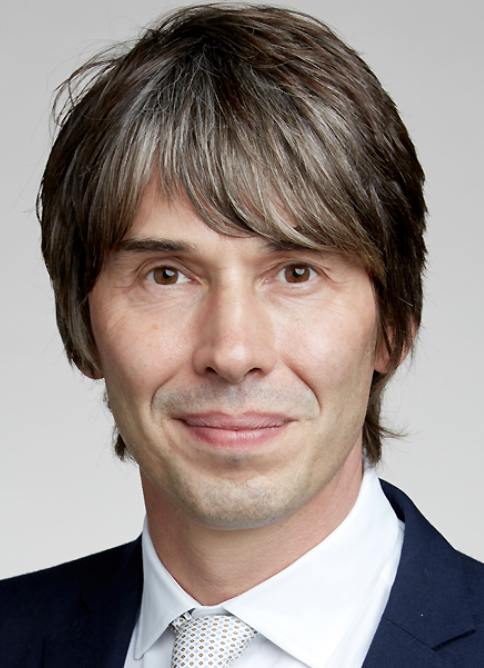
On this date in 1968, Brian Edward Cox was born in Lancashire, England. After completing his secondary education, Cox joined the rock band Dare as a keyboardist. Following the band’s breakup, Cox enrolled at the University of Manchester to study physics. He continued his career in music, playing with the pop band D:Ream, while receiving his B.Sc. and M.Phil degrees. D:Ream had several hits on the UK charts, including “Things Can Only Get Better,” a No. 1 hit.
As of this writing he works as a particle physicist at the University of Manchester and at the Large Hadron Collider near Geneva, Switzerland. He married Gia Milinovich in 2003 and they have one child. He was elected in 2016 as a Fellow of the Royal Society, the UK’s national academy of sciences.
Cox is best known for his science outreach to the general public and has appeared on numerous BBC television and radio programs. Cox also lectures widely, has given several TED talks, and has co-authored several books about physics, including 2009’s Why Does E=mc²? (And Why Should We Care?).
Cox is a strong advocate for science education and government funding of scientific research. Asked by the Guardian (March 6, 2010) if he has “ever believed in God,” Cox replied, “No! I was sent to Sunday school for a few weeks but I didn’t like getting up on Sunday mornings. But some of my friends are religious. I don’t have a strong view on religion, other than illogical religion. Young earth creationism, for example: bollocks.”
Cox says the label of atheist does not apply to him because there is so much that is unknowable. His story “The Large Hadron Collider: A Scientific Creation Story” was one of 42 included in “The Atheist’s Guide to Christmas” in 2009. From the essay: “When the pattern of atoms known as you ceases to be, the building blocks will return to the voids of space and in a billion years or more they may take their place in another structure so beautiful that a future mind may perceive it to be the work of a god.”
PHOTO: The Royal Society
“So for me, the idea I would be able to have an entertaining and enjoyable afternoon discussing with people with whom I suppose I have to say I disagree at the most fundamental level, because I don’t have a particular faith, or any faith in fact – however, I think that difference of opinion and view of the world is to be celebrated and explored.”
— "Professor Brian Cox condemns 'toxic' rows between science and religion," Christian Today (Sept. 9, 2016)
Louis “Studs” Terkel
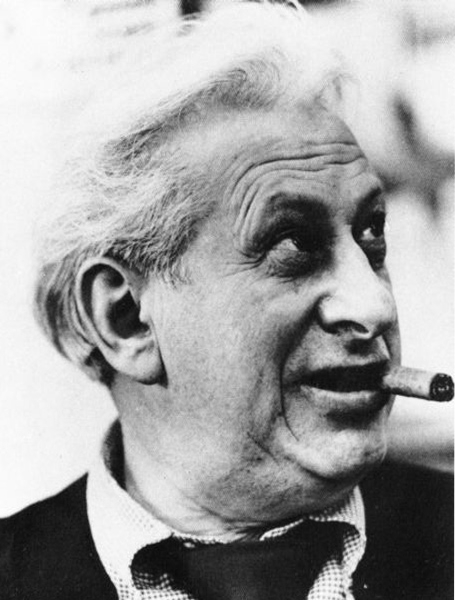
On this date in 1912, Louis Terkel was born in the Bronx, N.Y., the third son of Samuel Terkel, a tailor, and the former Anna Finkel, an emigrant from Bialystok, Poland. A spirited man, he called himself an agnostic. Life was about life, not looking ahead to death, said Terkel, who spent most of his 96 years on Earth in Chicago.
As an actor in the theater he took the name Studs, after James T. Farrell’s fictional Studs Lonigan. He earned degrees in law and philosophy, was part of the Federal Writers’ Project and worked in radio drama and scriptwriting. He created his own radio show in 1945, a blend of music, interviews and commentary.
“Studs’ Place,” his first TV show, went on the air in 1950 but was soon canceled due to NBC’s nervousness about Terkel’s left-wing politics. He was back on the radio before long at WFMT, where his on-air career flourished for decades. He interviewed Bertrand Russell in Wales in 1962 when Russell was 90. “In the course of nature, I will soon die,” Russell told him. “My young friends have the right to many fruitful years. Let them call me fanatic.”
Division Street: America (1966) was Terkel’s first best-seller and became the blueprint for other literary oral histories like Hard Times, Working, The Good War, Race and Coming of Age. All told, he wrote 18 books. The last (in 2008) was P.S.: Further Thoughts From a Lifetime of Listening. Terkel told AARP magazine (March/April 2006), “I think we’re capable of extraordinary things, human beings. I call that God-like.” He died at home in Chicago at age 96. (D. 2008)
“TIPPETT: So, you know, one thing that is very striking that I didn’t expect is that this book, your book about death, it’s really a very religious book.
TERKEL: Religious book?
TIPPETT: Yes. I mean, there’s a lot of religion in it, all the way through it. I mean, did you know that, that those themes would be so prominent when you started it?
TERKEL: Well, I knew religion would play a role when I — to be fair, I happen to be an agnostic. You know what an agnostic is, don’t you?
TIPPETT: Oh, yeah.
TERKEL: A cowardly atheist. And I’m an agnostic. … You asked about the afterlife. Well, I can’t take bets on it. Who’s going to take my bet, you know? I, myself, don’t believe in any afterlife. I do believe in this life, and what you do in this life is what it’s all about.”— Interview with Krista Tippett on "Speaking of Faith," American Public Media, 2004
Ron Reagan
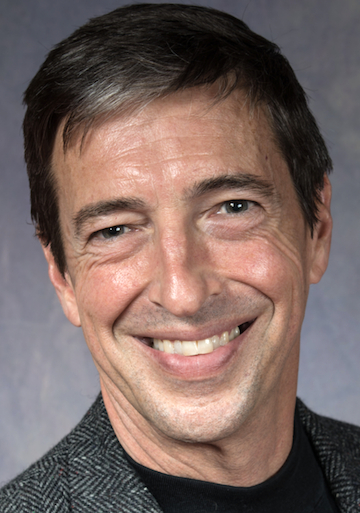
On this day in 1958, Ronald Prescott Reagan (Secret Service code name “Reliant”) was born in Los Angeles to Ronald Wilson Reagan and Nancy Reagan, the future U.S. president and first lady. As liberal as his famous father was conservative, Reagan stopped going to church when he was 12 and has publicly stated he’s an atheist numerous times. In 2004, he accepted FFRF’s Emperor Has No Clothes Award and spoke at the 2009 convention in Seattle.
Reagan grew up in Los Angeles and Sacramento, went to Yale University for a semester and then joined the Joffrey Ballet Company as a corps de ballet dancer. He left the Joffrey in 1983 and has since worked as a broadcast and print journalist and television and radio host. He co-hosted “Connected: Coast to Coast with Ron Reagan and Monica Crowley” on MSNBC, was a special correspondent for ABC’s “20/20” and “Good Morning America” and FOX News’ “Front Page,” as well as hosting the syndicated “Ron Reagan Show” starting in 1991.
He’s also done work for E! Entertainment Television, Animal Planet and American Movie Classics and has contributed to Newsweek, The New Yorker, Playboy, Los Angeles Times, Esquire and Interview. “The Ron Reagan Show,” syndicated by Air America Media, went on the air in 2008. Reagan serves on the Advisory Board of the Creative Coalition, a nonpartisan group founded in 1989 to mobilize entertainers and artists for causes such as First Amendment rights, arts advocacy and public education.
Reagan, along with his late mother, has been a strong supporter of embryonic stem cell research. “When you’re depriving people, potentially, of lifesaving or life-improving cures or treatments purely for political reasons, I find that to be really shameful.”
In a 2008 interview with The Hill newspaper, he was asked when he started questioning his father’s political beliefs: “Oh, puberty. Probably by age 12. That was when I told [my parents] I would no longer go to church with them because I was an atheist. One thing leads to another. It wasn’t a great leap to then disagree on politics.” Was he upset? “Yeah, but he wasn’t angry. He was a Christian and took it fairly seriously. He was worried that my life would be diminished if I didn’t accept Christ as my savior. We’d argue at the dinner table all the time, but I don’t think he was losing sleep over it.”
During a speech about stem cell research at the Democratic National Convention on July 27, 2004, Reagan voiced his opinion on church/state separation: “[I]t does not follow that the theology of a few should be allowed to forestall the health and well-being of the many.” The New York Times asked him in 2004, in an interview that ran three weeks after his father died, if he’d like to be president. “I would be unelectable,” Reagan said. “I’m an atheist. As we all know, that is something people won’t accept.”
Reagan, an honorary director of FFRF, generously recorded a radio spot for FFRF during Air America’s broadcast reign, then in 2014 agreed to record a TV ad for FFRF: “Hi, I’m Ron Reagan, an unabashed atheist, and I’m alarmed by the intrusion of religion into our secular government. That’s why I’m asking you to support the Freedom From Religion Foundation, the nation’s largest and most effective association of atheists and agnostics, working to keep state and church separate, just like our Founding Fathers intended. Please support the Freedom From Religion Foundation. Ron Reagan, lifelong atheist, not afraid of burning in hell.”
The ad ran on Comedy Central, CNN and MSNBC’s “Rachel Maddow Show” but was refused by CBS, NBC, ABC and Discovery Networks, apparently due to the irreverent reference to hell. The popularity of the quip has also inspired FFRF to produce a T-shirt, a bumper sticker and a lapel pin saying “Unabashed Atheist, Not Afraid of Burning in Hell,” as well as a personalized online interactive digital “billboard.”
Reagan addressed the FFRF national convention in 2015, where he said: “Blind faith is the abdication of reason. You can’t have a functioning democracy when most of the people believe in a lot of nonsense. If you want good public policy, it has to be based on facts and evidence. Private beliefs invade public policy. All the politicians you see invoking God were just private citizens once, and now they are in Congress.”
In an interview (Jan. 17, 2020) with the Daily Beast after his FFRF ad ran during a Democratic debate, Reagan said he found it curious that people who invoke “freedom of religion really mean freedom to be bigots. ‘Who can we refuse service to?’ It starts with LGBTQ people. What about unmarried couples? What about divorced people? What about black people? You can find justification for almost anything in the Bible, and it’s ugly, cruel, and stupid. We’re on to them. We’ll keep speaking up.”
He married Doria Palmieri in 1980, 20 days after his father was sworn in as president. She died in 2014 at age 62 from complications of a neuromuscular disease. In 2018 he married Federica Basagni, an Italian who was one of Doria’s closest friends.
“As for hell, mocking this imaginary threat rather strikes at the heart of religious belief in a way that I suspect most believers only intuitively grasp. It's a crucial support in their house of cards. Without hell, heaven is pointless.”
— Reagan email statement to FFRF Co-President Annie Laurie Gaylor (April 23, 2019)
Sarah Vowell
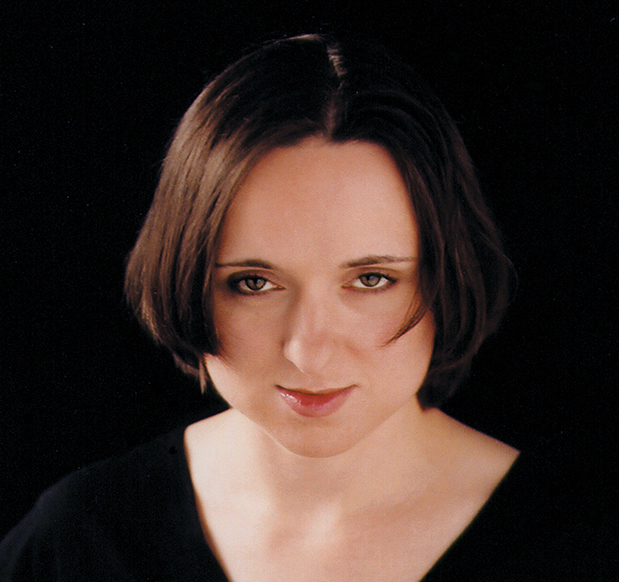
On this date in 1969, Sarah Jane Vowell was born in Muskogee, Okla., and moved with her family, which has Cherokee heritage, to Montana when she was 11. She has a fraternal twin sister, Amy. She majored in modern languages and literatures at Montana State University, where she received her B.A. in 1993 and went on to earn an M.A. in art history at the School of the Art Institute of Chicago. Vowell is the author of seven nonfiction books (as of this writing in 2019) as well as an essayist whose work has been published in The New York Times, Esquire, McSweeney’s and elsewhere.
Vowell has been a frequent contributor to public radio’s “This American Life” since 1996, the show’s first year. She voiced the character Violet in the film “The Incredibles” (2004).
Her books examine American history and the history of religion in America through a combination of road-trip memoir and insightful historical content. Assassination Vacation (2005) detailed presidential assassinations and 19th-century American history, including cults and quasi-religious themes. The Wordy Shipmates (2008) told the story of the Puritan settlement of Massachusetts and touched on the true origins of the idea of religious freedom in America as propounded by Roger Williams, the founder of Rhode Island exiled from Massachusetts Bay for his refusal to adhere to church doctrine.
Unfamiliar Fishes (2011) told the story of the loss of the traditional Hawaiian religion and inhabitants’ conversion to Christianity by missionaries from New England, along with the eventual U.S. conquest instigated by the first missionaries’ descendants in 1895. Lafayette in the Somewhat United States (2015) is an account of the Marquis de Lafayette, the young French aristocrat who became George Washington’s trusted officer and friend and an American celebrity.
She was asked in 2002 by The Onion AV Club “Is There a God?” She answered, “Absolutely not.” In a 2008 New York Times op-ed, she wrote, “I have become just another citizen whose only religion is the freedom of religion and as such I patrol the wall of separation between church and state like some jumpy East German guarding Checkpoint Charlie back before Ronald Reagan single-handedly tore it down.”
Vowell has never married or had children. She is on the advisory board of 826NYC, a nonprofit tutoring and writing center for students aged 6–18 in Brooklyn, N.Y.
PHOTO: By Bennett Miller
“Because I am a culturally Christian atheist the same way my atheist Reform friends are culturally Jewish, I look forward to Martin Luther King's Birthday — when the news momentarily replaces the rants of the faith-based spitfires with clips of what an actually Christlike Christian sounds like.”
— Vowell op-ed, New York Times (Jan. 21, 2008)
